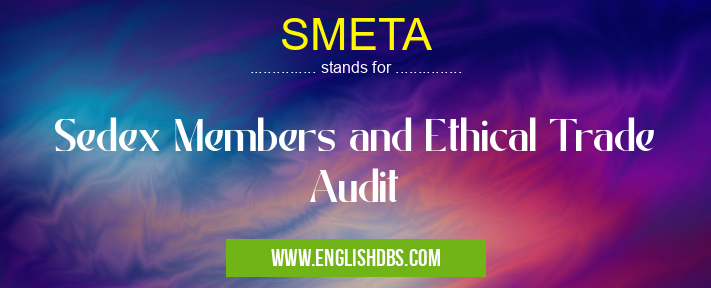What does SMETA mean in UNCLASSIFIED
SMETA stands for Sedex Members and Ethical Trade Audit. It is an internationally-recognized ethical trade audit program designed to ensure that the suppliers of goods and services meet the ethical standards of the organization they are associated with. The audit assesses both environmental and social performance of a supplier's facility, ensuring that they adhere to global labor standards such as fair wages, safe working conditions, and environmental regulations. SMETA audits can be conducted by independent third-party auditors or self-assessed by the supplier themselves. By conducting such audits, organizations are able to protect their brand reputation by upholding ethical practices within their supply chain.

SMETA meaning in Unclassified in Miscellaneous
SMETA mostly used in an acronym Unclassified in Category Miscellaneous that means Sedex Members and Ethical Trade Audit
Shorthand: SMETA,
Full Form: Sedex Members and Ethical Trade Audit
For more information of "Sedex Members and Ethical Trade Audit", see the section below.
Essential Questions and Answers on Sedex Members and Ethical Trade Audit in "MISCELLANEOUS»UNFILED"
What is Sedex?
Sedex (Supplier Ethical Data Exchange) is a not-for-profit membership organization that allows businesses to share and manage information on ethical and responsible practices within the supply chain.
How does the SMETA audit work?
A SMETA audit is an evaluation process conducted by an independent auditor to assess compliance with ethical trading initiatives and relevant labor regulations. The auditor assesses labor conditions, management systems, supplier qualifications, working conditions, working hours, wages & benefits and health & safety standards.
What are the advantages of getting a SMETA Audit?
Having a SMETA audit demonstrates to customers and stakeholders that you take ethical trading seriously, promotes good workplace practices as well as strengthens supply chain relationships and builds trust between suppliers and buyers.
Who should get a SMETA audit done?
Any company involved in global sourcing or international trade should consider a SMETA audit in order to ensure ethical business practices for all participants in the supply chain. This includes audits for both suppliers and buyers.
What is included in a SMETA audit?
A SMETA audit includes an evaluation of labour conditions, management systems, supplier qualifications, working conditions, working hours, wages & benefits and health & safety standards.
How long does a SMETA Audit typically take?
A full scale 2 Pillar (Ethical Trading Initiative + Employment Standards) typically takes 1-2 days depending on complexity of the site being audited. Nonetheless it could range from half day up to two days if necessary.
What kind of certificate is issued after completion of the audit?
Upon successful completion of a Sedex Members Ethical Trade Audit (SMETA) report signed off by your auditor, you will receive your issued “SMETA Best Practices†certificate indicating successful completion of the certification requirements.
Does Sedex provide training services for companies looking to get certified?
Yes! Sedex provides specialized educational modules tailored to help companies understand their obligations under ETI Base Code related topics such as conducting self-audits in accordance with ETI standards; developing documentations needed for compliance with ETI standards; managing corrective action plans; proper implementation of code related policies etc.
Final Words:
In conclusion, SMETA is used around the world as an ethical trade audit program that assesses environmental and social performance of suppliers in order to protect brand reputation through upholding ethical values within its supply chain networks. From interviewing workers to evaluating safety concerns, SMETA advocates sustainable approaches aimed at safeguarding human rights while promoting environmentally friendly practices throughout each area of production across the board. Organizations who incorporate this type of reliable system for assessing their suppliers can benefit from knowing that their products are being managed ethically - a factor which will become increasingly important in sustainable business operations today and into the future.
